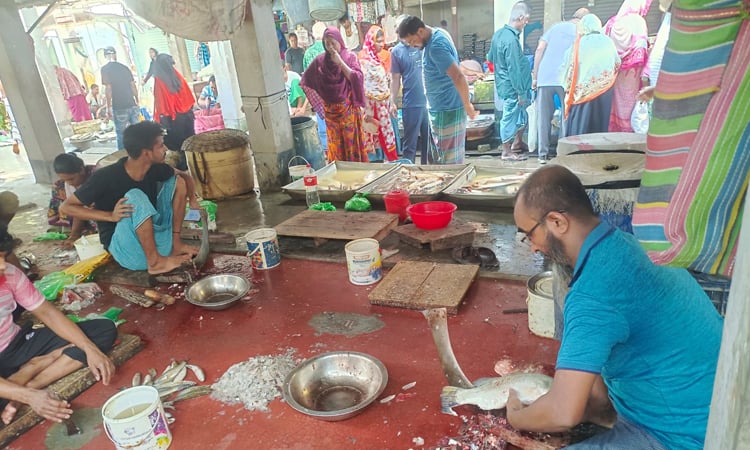News Flash
News Flash

By S M Zahid Hossain
KHULNA, Oct 31, 2025 (BSS) - Rustom Mia, 50, from the Baniakhamar area under Khulna Sadar Thana, used to work as a fish cutter at City's Sandha Bazar and Mistripara kitchen market about 15 years ago. He changed his fortune by selling fish scales and waste.
With an innovative move, he has now been able to support his family with the income generated from selling fish scales and waste. Fish scales, once considered waste in Khulna's fish markets, are now turning into a lucrative export item, contributing to the national economy with annual earnings of around Taka 3.5 crore.
Sharing Rustom's story with BSS recently, he said that he was a day labourer and could not run his family with his wife, two minor daughters and parents. Around 15 years ago, Rustom started fish cutting at the old Sandha Bazar with his neighbor aunt. Seven years ago, they collected wet fish scales and wastes from the market, cleaned and dried them, then sold them to traders, earning over Taka 20,000 per month.
After the death of his neighbor aunt, Rustom ran the little business with 8 to 10 employees and became self-reliant. Now he is earning over Taka one lakh after giving remuneration to his employees. Rustom has bought land and built a house. His one daughter is now reading at Rajshahi University, while his younger daughter is reading at Khulna Collegiate School.
Rustom said, "We dry the scales on rooftops, but if not properly dried, insects attack them, reducing quality. Damaged scales are sold cheaply to nursery owners for use as fertilizer."
Like Rustom, Robiul, Miraj and 50 more youths are engaging in this trading. They are cutting fish in city kitchen markets and collecting fish scales and wastes for selling.
Inspired by Rustom, Liala Begum at City's Sher-e-Bangla Road got involved in fish scale processing five years ago. She shared that in the beginning, she used to dry the scales on jute sacks spread on the ground, which resulted in lower quality and lower prices. Later, with training, support, and technology provided by a local NGO, she adopted a specialized processing method. This improved the quality of the product, allowing her to fetch higher prices.
In various fish markets of the city, including Gallamari, New Market, Moylapota Sandha Bazar (Evening Market), Boro Bazar, Tutpara, Mistripara and others, fish cutters collect the scales discarded during fish cleaning.
According to the Khulna Export Promotion Bureau, between July 2024 and April 2025, a total of 210,179 kilograms of dried fish scales worth USD 210,179 were exported to China, with seven export certificates issued during the period. Khulna District Fisheries Officer Md Badruzzaman said that from July 2024 to September 10, 2025, about 533,340 kilograms of fish scales were exported, valued at Tk 3.41 crore.
Local collectors say this new trade has provided them with an additional source of income. Tutul and Sajib, fish cutters at Gallamari market, said they used to throw fish scales into the dustbin, but after learning about their market value, they began drying and selling them.
"We collect about 8 to 10 maunds (300-375 kg) a year, which buyers from Chattogram purchase for Tk 60-70 per kilogram," they added. Similarly, Mamun Gazi, a 30-year-old collector at Sandhya Bazar, said he collects 4-5 kilograms of fish scales daily and dries them at home. "In a year, I store around 8 to 10 maunds, which wholesalers buy for about Taka 1,300 per maund," he said.
Talking to BSS, Professor Dr Nazmul Ahsan of the Fisheries and Marine Resources Technology Discipline at Khulna University said fish scales are now being used in various advanced applications such as corneal regeneration, cell structure formation, wound healing, bone repair, electrochemical processes, wastewater treatment, and cosmetics manufacturing. "Fish scales contain a rich composition of protein, minerals, and organic compounds," he explained.
"They have immense potential in medical science, aquaculture, and poultry feed industries. However, nearly 90 percent of fish scales in Bangladesh are still wasted. By promoting collection, processing, and marketing, many people could become self-reliant." He added, "If entrepreneurs establish processing industries to extract useful components from fish scales, Bangladesh could reduce imports, produce valuable local products, and significantly contribute to the national economy."
Zenat Ara, Director of Export Promotion Bureau (EPB) in Khulna, said that the country has been exporting an average of Tk 200 crore worth of fish scales annually. However, the quantity of exports has increased since 2020. In FY24, exports reached $17 million, equivalent to Tk206 crore.
For nearly a decade, Md Kamruzzaman from Jashore has been purchasing and exporting fish scales. He collects fish scales from all districts in the southern and northern regions of the country and exports at least 10 tonnes per month. The businessman said that in the past, entrepreneurs struggled to properly process fish scales.
However, after receiving various types of training, most of them can now process the scales efficiently. Kamruzzaman said he buys these processed scales and exports them to China, Japan, and Korea through different parties. He said fish waste is generated in almost all parts of the country. Proper management of this waste helps reduce environmental pollution, he added.